This article has been reviewed according to Science X's editorial process and policies. Editors have highlighted the following attributes while ensuring the content's credibility:
fact-checked
reputable news agency
proofread
Over and out: Germany switches off its last nuclear plants
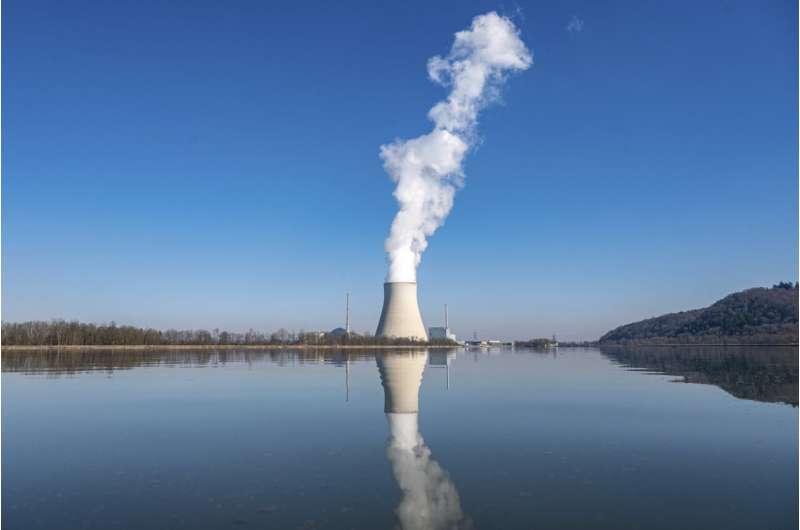
"Nuclear power, no thanks!" What was once a slogan found on the bumper of many a German car became a reality Saturday, as the country shut down its three remaining nuclear power plants in line with a long-planned transition toward renewable energy.
The shutdown of Emsland, Neckarwestheim II and Isar II shortly before midnight was cheered earlier in the day by anti-nuclear campaigners outside the three reactors and at rallies in Berlin and Munich. Inside the plants, staff held more somber ceremonies to mark the occasion.
Decades of anti-nuclear protests in Germany, stoked by disasters at Three Mile Island, Chernobyl and Fukushima, had put pressure on successive governments to end the use of a technology that critics argue is unsafe and unsustainable.
But with other industrialized countries, such as the United States, Japan, China, France and Britain, counting on nuclear energy to replace planet-warming fossil fuels, Germany's decision to stop using both has drawn skepticism at home and abroad, as well as unsuccessful last-minute calls to halt the decision.
Defenders of atomic energy say fossil fuels should be phased out first as part of global efforts to curb climate change, arguing that nuclear power produces far fewer greenhouse gas emissions and is safe, if properly managed.
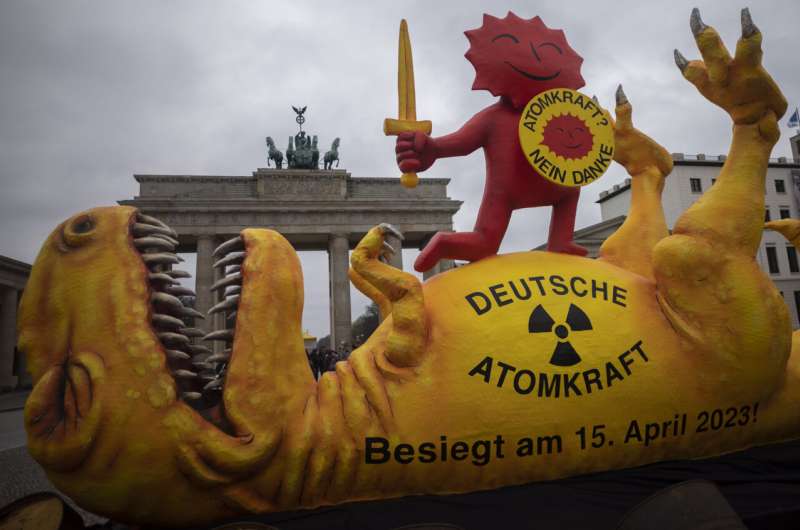
As energy prices spiked last year due to the war in Ukraine, some members of German Chancellor Olaf Scholz's government got cold feet about closing the nuclear plants as planned on Dec. 31, 2022. In a compromise, Scholz agreed to a one-time extension of the deadline, but insisted that the final countdown would happen on April 15.
Still, Bavaria's conservative governor, Markus Soeder, who backed the original deadline set in 2011 when Chancellor Angela Merkel was Germany's leader, this week called the shutdown "an absolute mistaken decision."
"While many countries in the world are even expanding nuclear power, Germany is doing the opposite," Soeder said. "We need every possible form of energy. Otherwise, we risk higher electricity prices and businesses moving away."
Advocates of nuclear power worldwide have slammed the German shutdown, aware that the move by Europe's biggest economy could deal a blow to a technology they tout as a clean and reliable alternative to fossil fuels. On Friday, dozens of scientists including James Hansen, a former NASA climate expert credited with drawing public attention to global warming in 1988, sent a letter to Scholz urging him to keep the nuclear plants running.
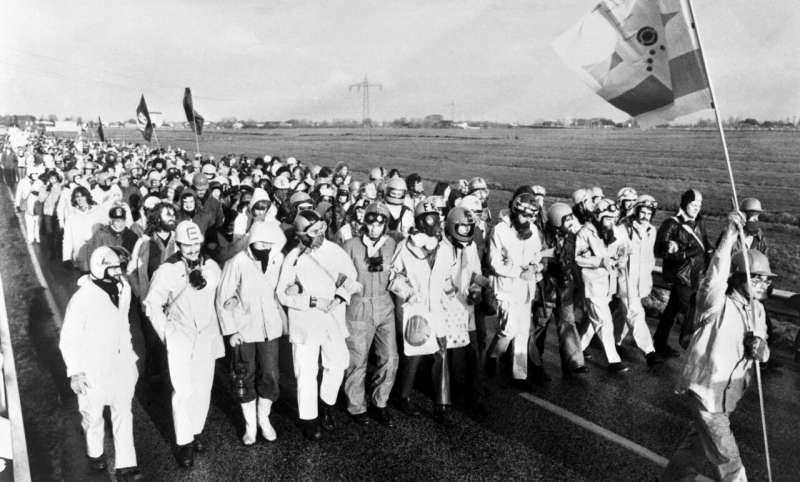
The German government has acknowledged that, in the short term, the country will have to rely more heavily on polluting coal and natural gas to meet its energy needs, even as it takes steps to massively ramp up electricity production from solar and wind. Germany aims to be carbon neutral by 2045.
But officials such as Environment Minister Steffi Lemke say the idea of a nuclear renaissance is a myth, citing data showing that atomic energy's share of global electricity production is shrinking.
At a recent news conference in Berlin, Lemke noted that new nuclear plants in Europe, such as Hinkley Point C in Britain, have faced significant delays and cost overruns. Funds used to maintain ageing reactors or build new ones would be better spent on installing cheap renewables, she said.
Energy experts such as Claudia Kemfert of the German Institute for Economic Research in Berlin say the 5% share of Germany's electricity currently coming from nuclear can be easily replaced without risking blackouts.
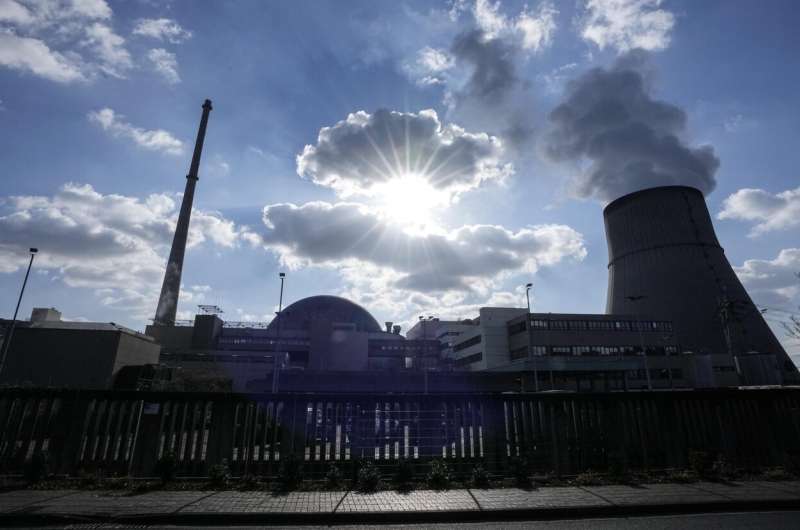
The northwestern town of Lingen, home to the Emsland plant, plans to become a hub for hydrogen production using electricity generated from North Sea wind farms, Mayor Dieter Krone told The Associated Press in an interview this week.
The power plant's operator, RWE, made clear that it is committed to the shutdown. The company still runs some of Europe's dirtiest coal-fired power plants. It recently pushed through the destruction of a village for a mine expansion as part of a plan to increase short-term production before ending coal use by 2030.
Many of Germany's nuclear power plants will still be undergoing costly dismantling by then. The question of what to do with highly radioactive material accumulated in the 62 years since the country's first reactor started operating remains unsolved. Efforts to find a final home for hundreds of containers of toxic waste have faced fierce resistance from local groups and officials, including Soeder, the Bavarian governor.
-

Bucket wheel excavators mine coal at the Garzweiler open-cast coal mine in Luetzerath, Germany, Oct. 25, 2021. Germany is shutting down its last three nuclear power plants on Saturday, April 15, 2023, as part of an energy transition agreed by successive governments. Critics have warned that without nuclear power, Germany will have to rely on dirty coal and gas plants for energy during periods of overcast but calm weather. Credit: AP Photo/Michael Probst, File -
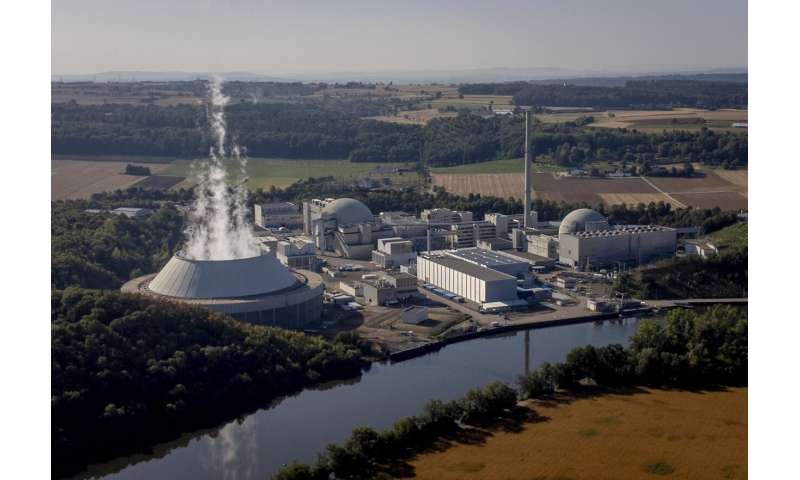
Water vapor rises from the cooling tower of nuclear power plant of Neckarwestheim II in Neckarwestheim, Germany, Aug. 22, 2022. Germany is shutting down this nuclear power plant and two others on Saturday, April, 2023, as part of an energy transition agreed by successive governments. Credit: AP Photo/Michael Probst, File -
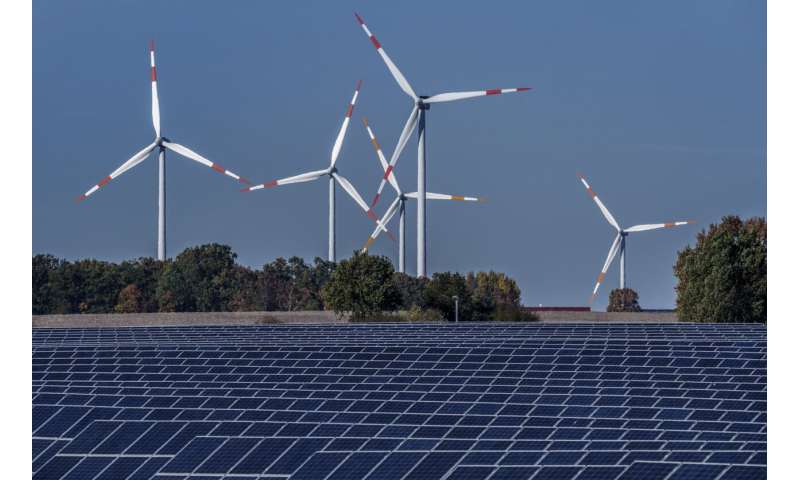
Wind turbines turn behind a solar farm in Rapshagen, Germany, Oct. 28, 2021. Germany is shutting down its last three nuclear power plants on Saturday, April 15, 2023, as part of an energy transition agreed by successive governments and the price of installing solar and wind energy has dropped significantly in recent years. Credit: AP Photo/Michael Sohn, File -
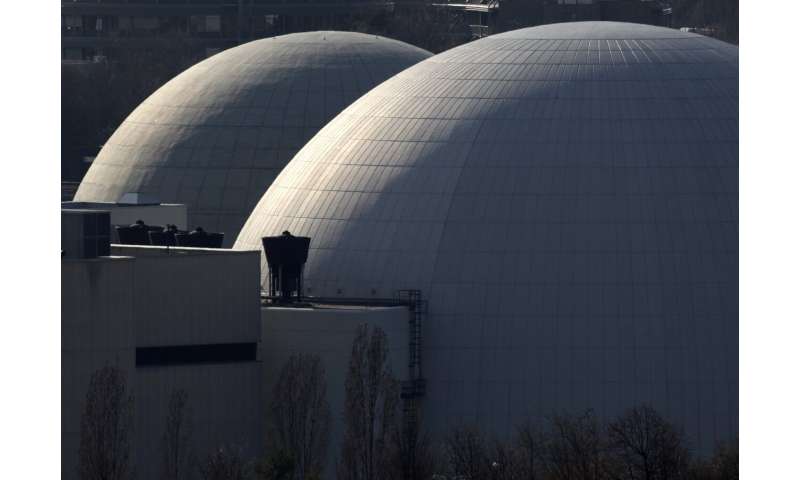
The nuclear plant of Neckarwestheim, southern Germany is pictured on March 15, 2011. Germany is shutting down this nuclear power plant and two others on Saturday, April, 2023, as part of an energy transition agreed by successive governments. Credit: AP Photo/Michael Probst, File -

A man with a gas mask protests near the chancellery against nuclear power in the wake of Japan's Fukushima reactor disaster in Berlin, March 26, 2011. The country's three remaining reactors are being shut down, because Germany long ago decided to end nuclear power due to its potential for catastrophic meltdown and long-term radioactive legacy while simultaneously phasing out fossil fuels over climate change.Credit: AP Photo/Markus Schreiber, File -
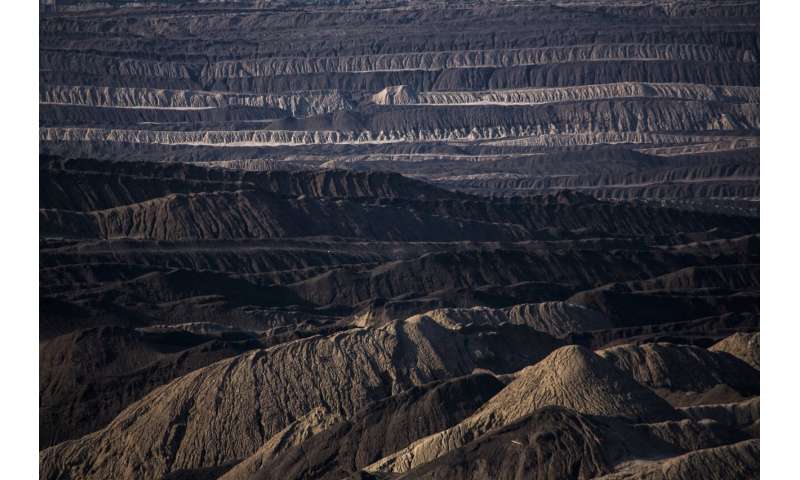
Mining debris covers the ground of a lignite coal pit near the village of Welzow in the Lusatia (Lausitz) area in Germany, June 5, 2018. Germany is shutting down its last three nuclear power plants on Saturday, April 15, 2023, as part of an energy transition agreed by successive governments. Critics have warned that without nuclear power, Germany will have to rely on dirty coal and gas plants for energy during periods of overcast but calm weather. Credit: AP Photo/Markus Schreiber, File -
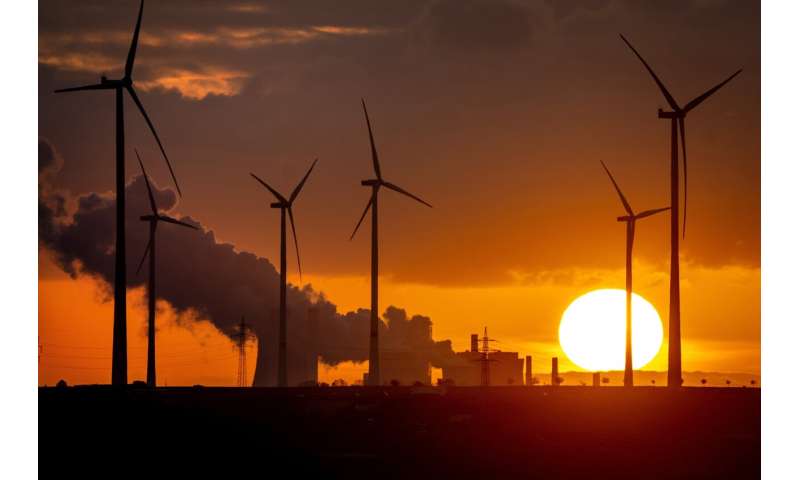
Steam rises from the coal-fired power plant near wind turbines in Niederaussem, Germany, as the sun rises on Nov. 2, 2022. Germany is shutting down its last three nuclear power plants on Saturday, April 15, 2023, as part of an energy transition agreed by successive governments. Critics have warned that without nuclear power, Germany will have to rely on dirty coal and gas plants for energy during periods of overcast but calm weather. Credit: AP Photo/Michael Probst, File -
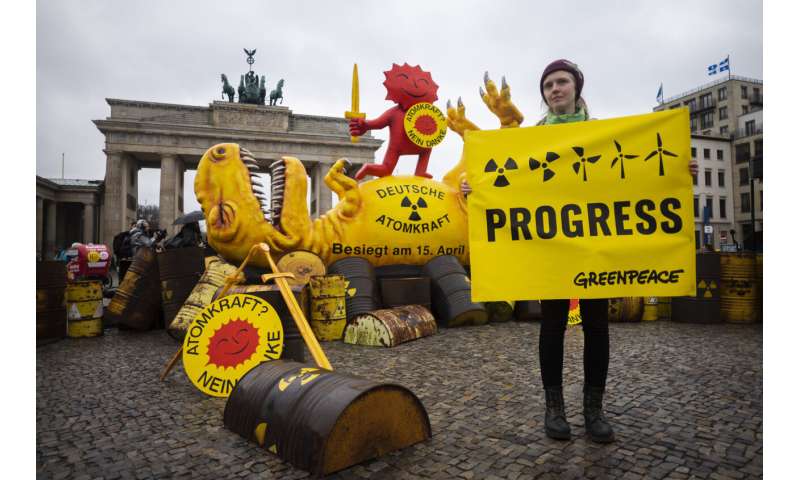
A Greenpeace activist poses with a poster in front of a mock-up dinosaur in front of the Brandenburg Gate during a rally marking the nuclear shutdown in Germany in Berlin, Germany, Saturday, April 15, 2023. Germany is shutting down its last three nuclear power plants on Saturday, April 15, 2023, as part of an energy transition agreed by successive governments. The signs read: 'Nuclear Power No Thanks' and the words on the dinosaur: 'German nuclear power defeated on April 15, 2023'. Credit: AP Photo/Markus Schreiber -
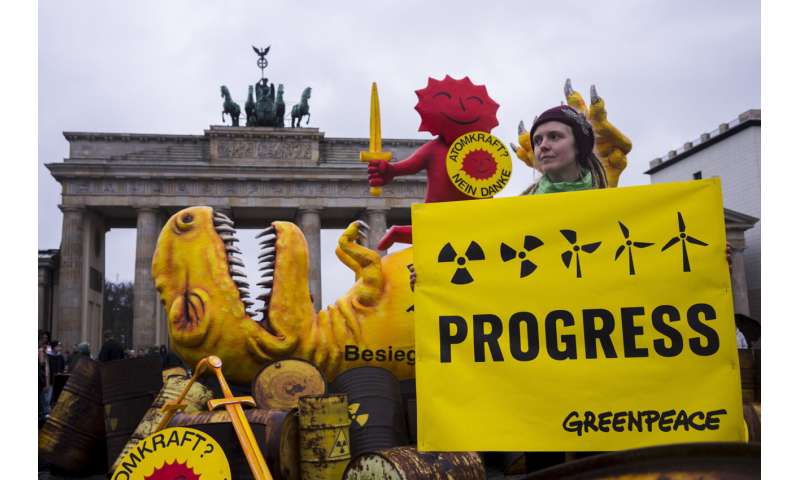
A Greenpeace activist poses with a poster in front of a mock-up dinosaur in front of the Brandenburg Gate during a rally marking the nuclear shutdown in Germany in Berlin, Germany, Saturday, April 15, 2023. Germany is shutting down its last three nuclear power plants on Saturday, April 15, 2023, as part of an energy transition agreed by successive governments. The signs read: 'Nuclear Power No Thanks' and the words on the dinosaur: 'German nuclear power defeated on April 15, 2023'. Credit: AP Photo/Markus Schreiber -
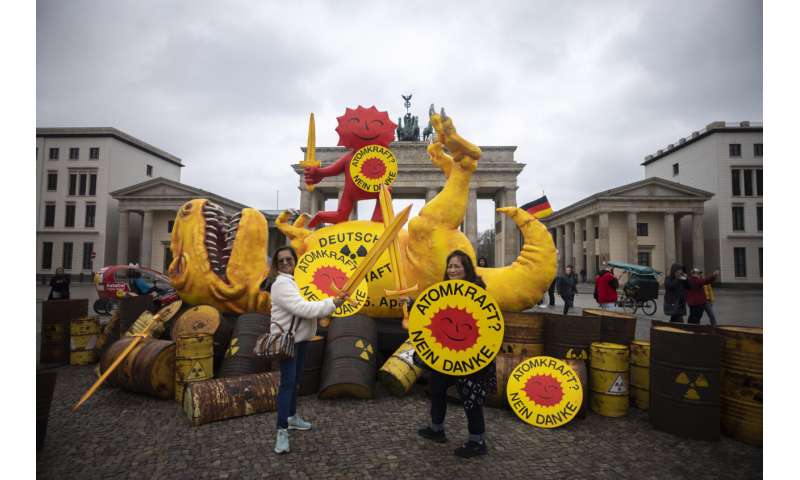
People pose in front of a mock-up dinosaur set-up by Greenpeace in front of the Brandenburg Gate during a rally marking the nuclear shutdown in Germany in Berlin, Germany, Saturday, April 15, 2023. Germany is shutting down its last three nuclear power plants on Saturday, April 15, 2023, as part of an energy transition agreed by successive governments. Credit: AP Photo/Markus Schreiber -

People attend a rally marking the nuclear shutdown in Germany in Munich, Germany, Saturday, April 15, 2023. Germany is shutting down the last three nuclear power plants today as a part of an energy transition agreed by successive governments. Credit: AP Photo/Matthias Schrader -
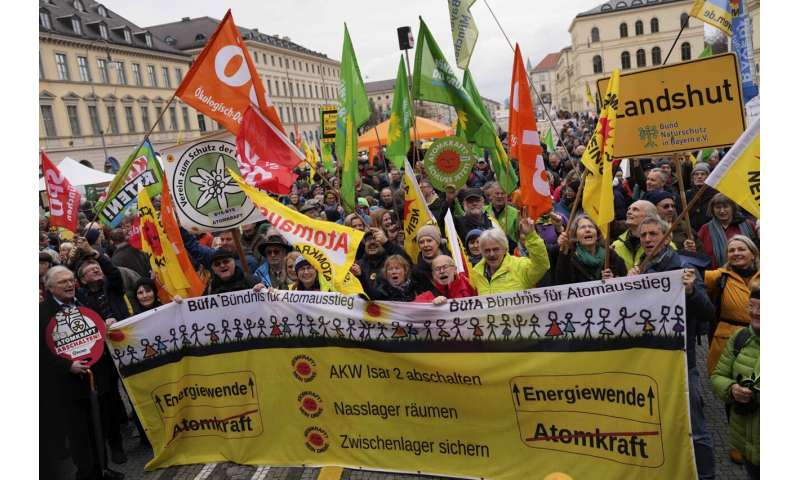
People attend a rally marking the nuclear shutdown in Germany in Munich, Germany, Saturday, April 15, 2023. Germany is shutting down the last three nuclear power plants today as a part of an energy transition agreed by successive governments. Credit: AP Photo/Matthias Schrader -
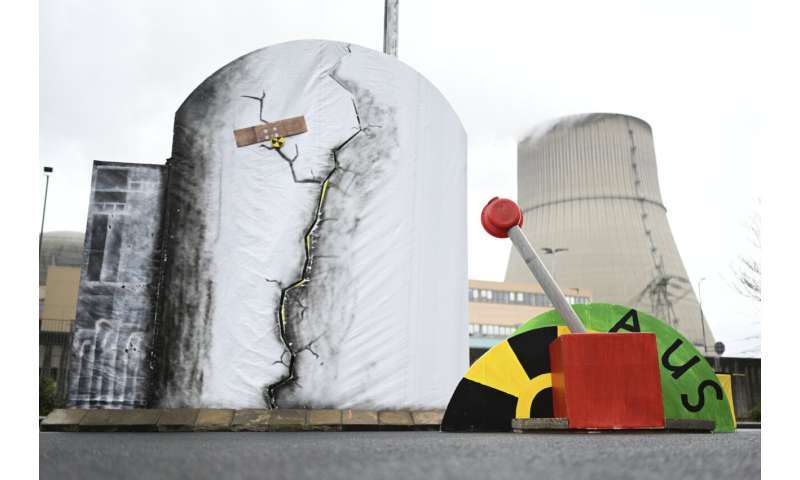
A mock lever to shut down the Emsland nuclear power plant is pictured in front of the power plant in , Lingen, Germany, Saturday, April 15, 2023. Germany is shutting down the last three nuclear power plants today as a part of an energy transition agreed by successive governments. Word reads 'off.' Credit: Lars Klemmer/dpa via AP -

Costumed people attend a rally in Munich, Germany, Saturday, April 15, 2023 marking the nuclear shutdown in Germany. Germany is shutting down the last three nuclear power plants today as a part of an energy transition agreed by successive governments. Slogan reads 'Nuclear Power Plant Shutdowner.' Credit: AP Photo/Matthias Schrader -
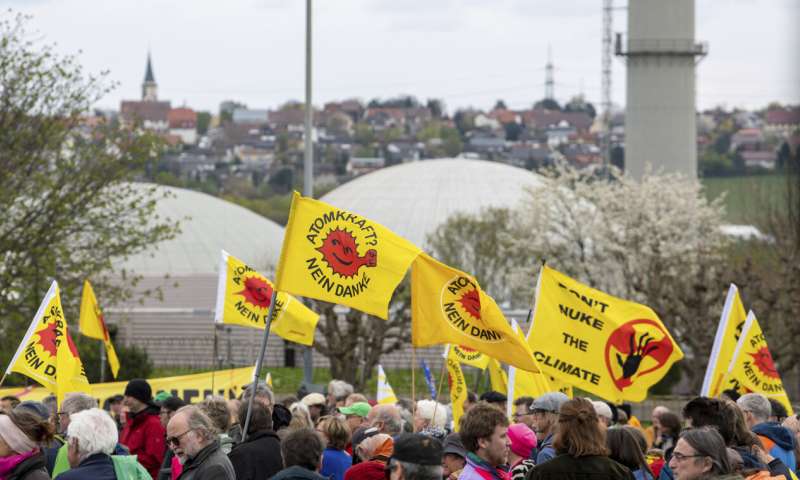
Activists celebrate a shutdown party in front of the nuclear power plant 'Isar 2' in Neckarwestheim, Germany, Saturday, April 15, 2023. Germany is shutting down the last three nuclear power plants today as a part of an energy transition agreed by successive governments. Credit: Stefan Puchner/dpa via AP -

A man with an anti-nuclear flag walks past a fence at the nuclear power plant 'Isar 2' in Neckarwestheim, Germany, Saturday, April 15, 2023. Germany is shutting down the last three nuclear power plants today as a part of an energy transition agreed by successive governments. Credit: Stefan Puchner/dpa via AP
"Nuclear power supplied electricity for three generations, but its legacy remains dangerous for 30,000 generations," said Lemke, who also pointed to previously unconsidered risks such as the targeting of civilian atomic facilities during conflicts.
Finding a place to safely store spent nuclear fuel is a problem that other nations using the technology face, including the United States. Still, U.S. Energy Secretary Jennifer Granholm has said that nuclear power will "play a critical role in America's clean energy future." This week, she welcomed Japan's decision to restart many of its reactors.
With debate raging again in Germany about whether the shutdown is a good idea, the top official in charge of nuclear safety at the Environment Ministry, Gerrit Niehaus, was asked by a reporter to sum up in a single sentence what lessons should be learned from the country's brief atomic era.
"You need to think things through to the end," Niehaus said.
© 2023 The Associated Press. All rights reserved. This material may not be published, broadcast, rewritten or redistributed without permission.


















